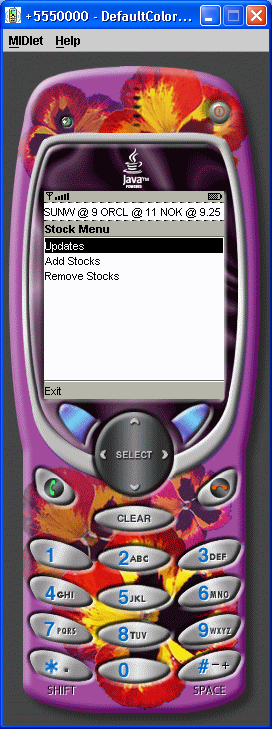A simple class that shows an example of using a Timer and a TimerTask.

/*
* Copyright (c) 2000-2001 Sun Microsystems, Inc. All Rights Reserved.
*/
import java.lang.*;
import java.io.*;
import java.util.*;
import javax.microedition.lcdui.*;
import javax.microedition.midlet.*;
/**
* A simple class that shows an example of using a Timer and
* a TimerTask.
*
* This MIDlet creates two gauges. One gauge gaugeOne,
* sets elements from low to high. The other, gaugeTwo,
* set elements from high to low. In effect, this has
* gaugeOne "going up", and gaugeTwo "going down."
*
* The two timers fire at different intervals.
*
* There are two commands on our form:
*
* OK: toggles whether the times are active or not.
* EXIT: exits the MIDlet.
*/
public class TimerMIDlet extends MIDlet implements CommandListener {
// number of elements in gauge
final private static int GAUGE_MAX = 10;
private boolean timersRunning; // tracks state of timers
private Display myDisplay; // handle to the display
private Gauge gaugeOne; // "going up" gauge
private Gauge gaugeTwo; // "going down" gauge
private Form myScreen; // form on which to
// place gauges
private Command cmdOK; // OK command
private Command cmdExit; // EXIT command
private Timer timer;
private MyTimerTask timerTaskOne;
private MyTimerTask timerTaskTwo;
/**
* Internal class that provides a TimerTask.
*/
private class MyTimerTask extends TimerTask {
private Gauge myGauge; // reference to gauge
private boolean goUp; // if true, go up
private int num; // number of times called
/**
* Public constructor: stores "direction" and a reference to
* a gauge.
*/
public MyTimerTask(Gauge g, boolean up) {
myGauge = g;
goUp = up;
}
/**
* As the timer fires, this method is invoked. Set gauge
* based on goUp
*/
public void run() {
num++;
myGauge.setValue(goUp ?
GAUGE_MAX -(num % GAUGE_MAX) :
num % GAUGE_MAX);
}
}
/**
* Public constructor: gets handle to display,
* creates form, gauges, and commands.
*/
public TimerMIDlet() {
myDisplay = Display.getDisplay(this);
myScreen = new Form("TimerMIDlet");
gaugeOne = new Gauge("Up Gauge",
false,
GAUGE_MAX,
0);
myScreen.append(gaugeOne);
gaugeTwo = new Gauge("Down Gauge",
false,
GAUGE_MAX,
GAUGE_MAX);
myScreen.append(gaugeTwo);
cmdOK = new Command("OK", Command.OK, 1);
cmdExit = new Command("Exit", Command.EXIT, 1);
myScreen.addCommand(cmdOK);
myScreen.addCommand(cmdExit);
myScreen.setCommandListener(this);
}
/**
* Changes the state of timers to/from active to/from
* not-active.
*/
private void flipFlop() {
if (timersRunning) {
timerTaskOne.cancel();
timerTaskTwo.cancel();
timer.cancel();
timersRunning = false;
} else {
timer = new Timer();
timerTaskOne = new MyTimerTask(gaugeOne, false);
timerTaskTwo = new MyTimerTask(gaugeTwo, true);
timer.schedule(timerTaskOne, 0, 1000);
timer.schedule(timerTaskTwo, 0, 1500);
timersRunning = true;
}
}
/**
* Called by the system to start our MIDlet.
* @exception MIDletStateChangeException
*/
protected void startApp() throws MIDletStateChangeException {
myDisplay.setCurrent(myScreen);
flipFlop();
}
/**
* Called by the system to pause our MIDlet.
* No actions required by our MIDLet.
*/
protected void pauseApp() {}
/**
* Called by the system to end our MIDlet.
* No actions required by our MIDLet.
*/
protected void destroyApp(boolean unconditional) {}
/***
* Respond to command selections. Process two commands:
*
* OK: flip flop the timers to/from active
* EXIT: exit this MIDlet
*
*/
public void commandAction(Command c, Displayable d) {
if (c == cmdOK) {
flipFlop();
} else if (c == cmdExit) {
destroyApp(false);
notifyDestroyed();
}
}
}
Related examples in the same category